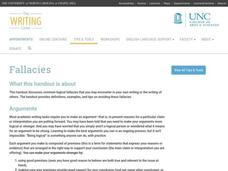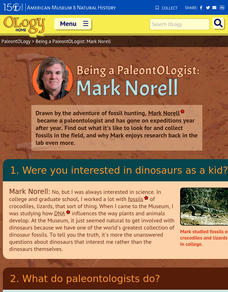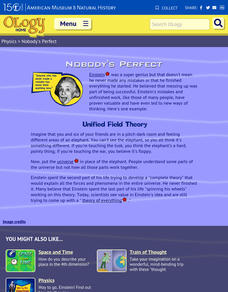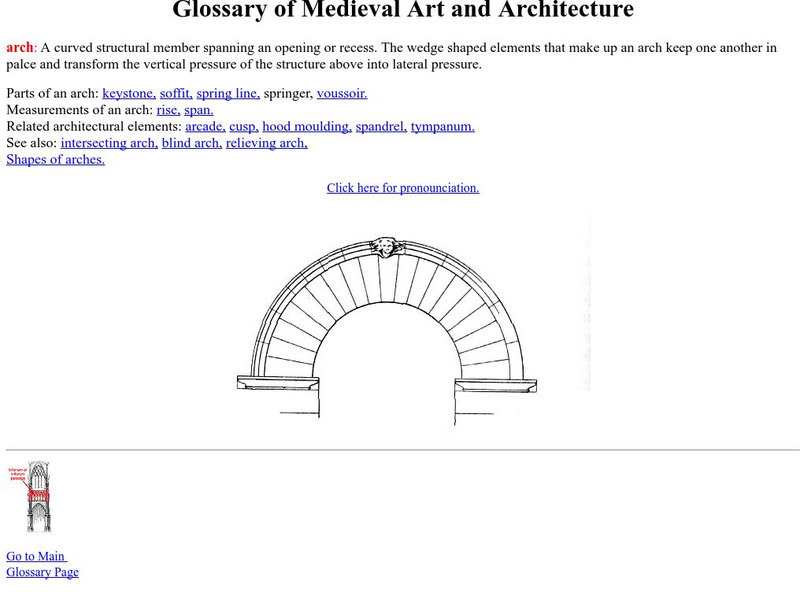Judicial Learning Center
Article III and the Courts
What's the best way to make sense of the Constitution? A helpful lesson contains both the text of Article III and annotation of each of its sections, breaking it down into easy-to-understand parts. It also includes links to a...
University of North Carolina
Fallacies
All teacher workrooms contain a coffee maker, therefore all teachers must be addicted to coffee. That sentence represents a logical fallacy (although it may be true from some), a topic the seventh installment in the 24-part Writing the...
New York City Department of Education
Project Based Learning
After reviewing the information included in this resource, you will be an expert in both the definition of project-based learning and how to implement it with your class. Discover and explore thorough explanations, detailed...
Judicial Learning Center
Your Day in Court
Whether out of choice or necessity, people want to know what will happen on a typical day in court. A helpful lesson walks scholars in the field of criminology through the trial process from opening statements to the final verdict.
Judicial Learning Center
Types of Court Cases
How can one court acquit someone of a crime, while another convicts the person of the same one? It's all because of the differences between civil and criminal trials. An informative resource provides scholars in the field of criminology...
Judicial Learning Center
The Players in the Courtroom
Courtrooms are complicated. In addition to the many rules, there are a number of people whose jobs are not very clear to the casual courtroom observer. With the resource, individuals identify some of these roles and review more...
University of North Carolina
Latin Terms and Abbreviations
N.B.. cit., n.b., viz., sc., inf. e,g,—these abbreviations frequently appear in academic papers and on works cited lists, but what do they mean? Part of a larger series to improve writing skills, the handout on Latin terms and...
American Museum of Natural History
Being a Paleontologist: Mark Norell
Get to know paleontologist Mark Norell with a 19 question interview. Written questions, answers, and photographs with descriptions sit among bright and cheery graphics
Judicial Learning Center
Why Study Landmark Cases?
Why study landmark Supreme court cases? A helpful lesson offers a brief but valuable argument for the importance of these cases in the field of criminology. It introduces scholars to some key terms necessary for studying court cases and...
Judicial Learning Center
The Constitution and Rights
What's the right way to teach young historians about the Bill of Rights? Many an instructor has asked this question when pondering lesson plans over the US Constitution. The Constitution and Rights is a nifty resource that provides a...
American Museum of Natural History
Space and Time
Carve out some time to learn about space-time. Young scientists use a remote learning resource to read up on the relationship between space and time. They consider the idea of relativity, see how objects with a large mass can bend space...
American Museum of Natural History
Nobody's Perfect
Even Einstein made mistakes, you know. A remote learning resource explains how scientists are sometimes unsuccessful. Pupils learn about Einstein's failed quest to find a unified field theory that explained the entire universe.
Curated OER
Bermuda Triangle
Young scholars explore what the Bermuda triangle is and the theories as to why it is so mysterious. In this mystery lesson students read and discuss the history and the mystery behind the Bermuda Triangle.
Other
University Freiburg, Germany: The Seed Biology Place
Providing advanced information on seed anatomy and structure, this site from a German University offers many illustrations, descriptions, and examples of seeds based on research taking place in the Gerhard Leubner lab. Topics covered...
Middle School Science
Hurricane Unit
In this comprehensive site you will find links to the following topics: parts of the hurricane, naming hurricanes, stages of development, rating hurricanes, online tracking of hurricanes, printable tracking maps, hurricane safety,...
Other
My Jewish Learning: Rosh Hashanah
A comprehensive resource about Rosh Hashanah sponsored by Hillel, the foundation for Jewish student life at universities around the world. Learn about the themes explored in Rosh Hashanah liturgies, the origins of the holiday, foods that...
University of Pittsburgh
Univ. Of Pitt: Glossary of Medieval Art and Architecture
Here at the University of Pittsburgh is a definition, a list of parts, and a diagram for an arch.
New York University
Langone Medical Center: Kleptomania
A one-page definition of kleptomania that also includes a drawing of the affected part of the brain - the frontal lobe. Information on causes, risk factors, symptoms, diagnosis, and treatment is provided.
NASA
Nasa Star Child: The Solar System
Discover information about parts of the Solar System, along with definitions just by clicking on highlighted vocabulary terms. Be sure to try the "Solar System Activities" to review the material from these pages.
Other
Macomb Intermediate School District: Gifted Children
Part of a Michigan school site, this page offers several definitions of giftedness, lists characteristics and behaviors of gifted students, and confirms ways of addressing their special needs.


















